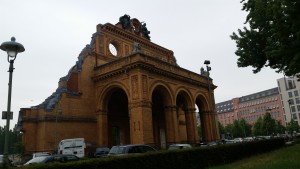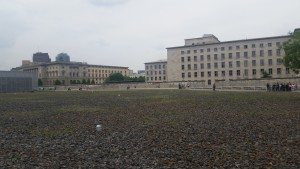Berlin, the heart of Germany. It was the heart of the Nazi Empire and it was a major component of the Cold War. Today the remnants of those dark times are clearly evident in the city. Unlike many of the places I’ve seen, Berlin doesn’t attempt to hide what they did during those times. From looking up at the buildings to looking down at the sidewalk and everything in between, I could see the lingering remains of what happened in Berlin during the 20th century.
Many of Berlin’s streets have some sort of relic of World War II. Only a few minutes’ walk from where I stayed, the remains of a major train station stand. The main entrance is all that remains, after significant bombing during the war left most of it in pieces. The place where it once stood has now since been turned into a park but there are still some remnants of what once was. Even the sidewalks have small plaques that represent where Jews were forced out of their homes and sent to ghettos and camps. These small reminders cover the city, almost forcing its inhabitants to relive the events of the city’s tragic past.
One of the most important reminders that one can find all over the city is the remains of the Berlin Wall. A line
cuts through the city, showing the world where the wall had once stood. Even after 27 years, there is still a sense of a divide between the two sections of the city. Newly rebuilt areas of the city are still struggling to rejuvenate after being part of the no-man’s land that prevented people from going between East and West Berlin. What was once East Berlin seems to be lagging a bit behind West Berlin but despite the divide, Berlin is continuing on as it was meant to, as one city.
The biggest difference between Berlin and the rest of the world is how they have coped with what happened during World War II. Places like France and Poland seemed to glorify all the good they did during the war but completely disregarded anything that makes their nation look bad. Berlin is different. Even the museums within Berlin show a significantly more objective point of view compared to any other place that I have been to in Europe. They are even teaching their children at a young age about what happened in this city and explaining how things got so bad.
Whether it be the Cold War or World War II, Berliners are constantly reminded of what had transpired there. I believe many cities should take note and follow Berlin’s example. You can’t change history no matter how hard one tries so instead of running from it, confront it and learn from the mistakes of the past. I think because Berlin doesn’t try to cover it up, the city has grown so much more than it would have otherwise. No city, that I can recall, has dealt with their complex history as Berlin and that is what separates this grand city from the rest.


